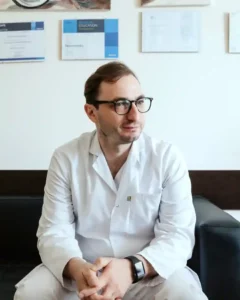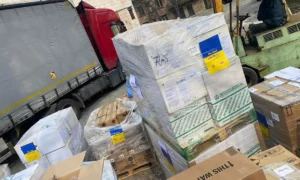Ukraine’s leading cancer hospital has kept going despite losing medics to combat, patients with no homes to return to and vital drugs running low
Serhiy, who comes from Mariupol, underwent surgery for lung cancer on 22 February. He was in the recovery ward two days later when he was woken up by the sounds of war. “ I thought it was a fire alarm,” he said. “It was a double shock to learn what had happened from a nurse. Not only had Russia invaded my country, but I could barely move after my operation and we needed to get to the bomb shelter.”
Serhiy was among 450 patients who were receiving treatment at the National Cancer Institute in Kyiv when Russia invaded on 24 February; 40 of them were children recovering after surgery, chemotherapy or bone marrow transplants.
Life changed irrevocably for everyone in Ukraine that day, but the institute’s oncologists knew they still had a job to do. They were soon having to operate not only as the leading centre in the country for patients in need of lifesaving cancer treatment, but a refuge from the Russian army’s murderous path. For those like Serhiy who were unable to return to their own homes or cities – Mariupol, Kherson and towns near Kyiv were either under bombardment or occupation – the institute was the only place where they could stay.
Serhiy and his wife stayed at the Institute until 20 April before heading to western Ukraine to continue his cancer treatment. “I’m not alone in this situation,” he said by phone . “There are thousands of cancer patients from Mariupol and other cities now occupied by Russia who have been left homeless, without work, without money, and on top of all that, we still need to continue our treatment.”
Founded in 1920, the National Cancer Institute is one of the oldest and most respected medical institutions in Ukraine. The exterior of its main buildings, which date back to the 1960s and 70s, is adorned by a huge Soviet-era mosaic.
Prior to the invasion, doctors here who had access to operating rooms unparalleled in Ukraine, annually treated more than 25,000 cancer patients and performed 8,000 surgeries.

“The first days of the invasion brought uncertainty and a sudden halt to the usual way we did things,” says Andriy Beznosenko, the institute’s lead doctor and a colorectal cancers specialist. “A quarter of our employees could not get to work or were caught up with moving their families to the west of Ukraine.”
Several doctors were also conscripted or volunteered to go to fight on the frontlines. Makeshift beds quickly filled up the corridors located deep within the building to protect patients from missile strikes. With space running out, admitting new patients became difficult.
By week two, says Beznosenko, doctors and patients had started to adapt. Where possible, children were evacuated to Poland and adult patients from the east were moved to medical facilities in the west of the country.
But more than two months into the war, 85% of staff have resumed work in Kyiv. Many have even moved into the Institute’s premises themselves. “It’s actually been very convenient,” says Beznosenko. “You practice medicine, hold online conferences with doctors from other countries, analyse the professional situation in oncology and, as a result, you’re less distracted, nervous, or in a hurry.”
Volunteers at the Institute also set up a 24/7 hotline that offers psychological help to cancer patients faced with the added trauma of dealing with serious medical issues during wartime. Only radiation therapy has not fully resumed operations.
Countless Ukrainian cancer patients have, along with the 5 million people who have fled the country, ended up in Poland, Germany, the Baltic states and elsewhere seeking treatment. However many fled without first being able to obtain their medical records. Despite the circumstances, the institute has been able to supply digitised copies of records for many, and sometimes even provide consultations remotely. Beznosenko estimates that between 15% and 20% of Ukrainian cancer patients have had to discontinue their treatment as a result of the Russian invasion.
 Medics from the Ukrainian diaspora worldwide, meanwhile, are organising for materials to be sent to the institute. More than 2,000 bottles of Keitrude, one of the most expensive cancer drugs in the world – a single dose costs more than $5,000 (£4,000) to administer – was recently obtained free of charge via a donation.
Medics from the Ukrainian diaspora worldwide, meanwhile, are organising for materials to be sent to the institute. More than 2,000 bottles of Keitrude, one of the most expensive cancer drugs in the world – a single dose costs more than $5,000 (£4,000) to administer – was recently obtained free of charge via a donation.
But the Kyiv clinicians say they are committed to more than diagnosing and treating cancer. They have been reaching out to the top US cancer centres asking them to take in and train Ukrainian oncologists who have fled the war, most of whom are women, since most men are not allowed to leave the country. The bureaucracy of the American medical and legal systems have made this a major challenge, but Beznosenko says they remain determined.
His team is also documenting their experiences and the lessons they have learned about wartime cancer treatment for the future research benefit of the international medical community. “We have an obligation to do so,” he says. “Let it be that none of them ever need it, but it is better that they are at least aware of what we’ve managed to do. We didn’t have access to the lessons learned by doctors in Syria or Afghanistan.”
The situation remains dire for cancer patients in eastern Ukraine. Two oncology centres, one in Kharkiv and one Mariupol, were completely destroyed by Russian missile strikes and had to cease operations, according to Beznosenko. Nor is the Russian army providing humanitarian corridors from occupied areas to cancer patients who need treatment, he said. Oncology units in Chernihiv, Sumy, and Mykolaiv have repeatedly been hit by missile strikes yet they are continuing to take in patients.
Even in peacetime, oncologists engage in a daily fight with a ruthless and unpredictable disease. In this sense, these doctors were already battle-hardened. With help from the global medical community, they feel prepared for a long haul. Ukrainians, Beznosenko said, “will remember the help we received during this terrible time for centuries to come”.
I write from Ukraine, where I’ve spent much of the past six months, reporting on the build-up to the conflict and the grim reality of war. It has been the most intense time of my 30-year career. In December I visited the trenches outside Donetsk with the Ukrainian army; in January I went to Mariupol and drove along the coast to Crimea; on 24 February I was with other colleagues in the Ukrainian capital as the first Russian bombs fell.
This is the biggest war in Europe since 1945. It is, for Ukrainians, an existential struggle against a new but familiar Russian imperialism. Our team of reporters and editors intend to cover this war for as long as it lasts, however expensive that may prove to be. We are committed to telling the human stories of those caught up in war, as well as the international dimension. But we can’t do this without the support of Guardian readers. It is your passion, engagement and financial contributions which underpin our independent journalism and make it possible for us to report from places like Ukraine.
If you are able to help with a monthly or single contribution it will boost our resources and enhance our ability to report the truth about what is happening in this terrible conflict.
Thank you.
Luke Harding
Foreign correspondent